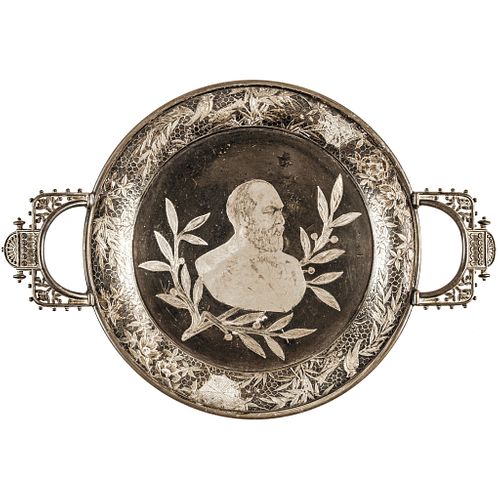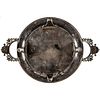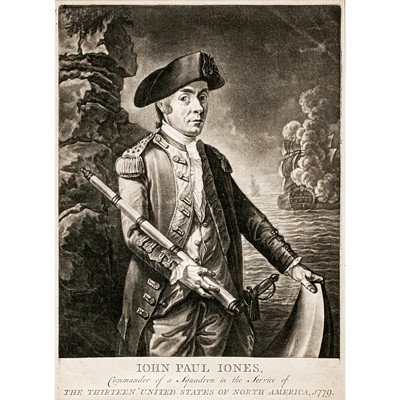c 1880 Pres. Campaign James A. Garfield Engraved Ornate Silverplate Serving Tray
Lot 258
Categories
Estimate:
$400 - $600
Absentee vs Live bid
Two ways to bid:
- Leave a max absentee bid and the platform will bid on your behalf up to your maximum bid during the live auction.
- Bid live during the auction and your bids will be submitted real-time to the auctioneer.
Bid Increments
| Price | Bid Increment |
|---|---|
| $0 | $10 |
| $200 | $20 |
| $300 | $25 |
| $500 | $50 |
| $1,000 | $100 |
| $2,000 | $200 |
| $3,000 | $250 |
| $5,000 | $500 |
| $10,000 | $1,000 |
| $20,000 | $2,000 |
| $30,000 | $2,500 |
| $50,000 | $5,000 |
| $100,000 | $10,000 |
| $200,000 | $20,000 |
| $300,000 | $25,000 |
| $500,000 | $50,000 |
About Auction
By Early American History Auctions
Jan 23, 2021
Set Reminder
2021-01-23 12:00:00
2021-01-23 12:00:00
America/New_York
Bidsquare
Bidsquare : Early American History Auction of Autographs, Americana, Political & Maps
https://www.bidsquare.com/auctions/early-american-history-auctions/early-american-history-auction-of-autographs-americana-political-maps-6311
311 Lots of Rare, Historic Autographs, Americana, Civil War Era, George Washington, Abraham Lincoln, Slavery & Black History, Revolutionary War Era, Colonial America, Federal Period, War of 1812, Colonial Currency, Indian Peace Medals & more... Early American History Auctions auctions@earlyamerican.com
311 Lots of Rare, Historic Autographs, Americana, Civil War Era, George Washington, Abraham Lincoln, Slavery & Black History, Revolutionary War Era, Colonial America, Federal Period, War of 1812, Colonial Currency, Indian Peace Medals & more... Early American History Auctions auctions@earlyamerican.com
- Lot Description
Political
James A. Garfield Engraved Ornate Silverplate Serving Tray
c. 1880 Presidential Campaign or Commemorative, James A. Garfield Ornate Silveprlate Serving Tray, Engraved in the center with a Bust Image of James A. Garfield and highly decorative surround, Choice Very Fine.
JAMES A. GARFIELD (1831-1881), 20th President of the United States, Assassinated in 1881, serving from March 4, 1881, until his death by Assassination just six and a half months later. This Ornate Silverplate Serving Tray is Engraved in the center with a large Bust of James A. Garfield, with a highly decorative surround of Birds, Floral and Spider Webs. We believe this was produced during the 1880 Presidential Campaign, or as a Commemorative to honor Garfield as the newly elected President. This round tray measures 8" in diameter and stands on four 1 1/2" long legs. The engraved Bust of Garfield measures 3-1/8" x 2.5" and sits amid an olive branch and numerous decorations. Hallmarked by the Meriden Britannia Co. of Meriden, Connecticut, Serial #177. This tray is in nice quality having no obvious dings or marks, yet was lightly used and displayed in the past. This example previously acquired in a major Midwest auction in June 2005 where it brought $299 with no other offered since. The first of this 1880 Presidential Campaign or Commemorative rarity we've offered.
James Abram Garfield (November 19, 1831 - September 19, 1881) was the 20th president of the United States, serving from March 4, 1881, until his death by assassination six and a half months later. He is the only sitting member of the United States House of Representatives to be elected to the presidency.
Garfield was born into poverty in a log cabin and grew up poor in Northeast Ohio. After graduating from Williams College, Garfield studied law and became an attorney before entering politics as a Republican in 1857. He served as a member of the Ohio State Senate from 1859 to 1861. Garfield opposed Confederate secession, served as a major general in the Union Army during the American Civil War, and fought in the battles of Middle Creek, Shiloh, and Chickamauga. He was first elected to Congress in 1862 to represent Ohio's 19th district. Throughout Garfield's congressional service after the war, he firmly supported the gold standard and gained a reputation as a skilled orator. He initially agreed with Radical Republican views on Reconstruction, but later favored a moderate approach to civil rights enforcement for freedmen.
At the 1880 Republican National Convention, delegates chose Garfield, who had not sought the White House, as a compromise presidential nominee on the 36th ballot. In the 1880 presidential election, he conducted a low-key front porch campaign and narrowly defeated Democrat Winfield Scott Hancock. Garfield's accomplishments as president included a resurgence of presidential authority against senatorial courtesy in executive appointments, purging corruption in the Post Office, and appointing a U.S. Supreme Court justice. He enhanced the powers of the presidency when he defied the powerful New York senator Roscoe Conkling by appointing William H. Robertson to the lucrative post of Collector of the Port of New York, starting a fracas that ended with Robertson's confirmation and Conkling's resignation from the Senate. Garfield advocated agricultural technology, an educated electorate, and civil rights for African Americans. He also proposed substantial civil service reforms, which were passed by Congress in 1883 and signed into law by his successor, Chester A. Arthur, as the Pendleton Civil Service Reform Act.
On July 2, 1881, Charles J. Guiteau, a disappointed and delusional office seeker, shot Garfield at the Baltimore and Potomac Railroad Station in Washington D.C. The wound was not immediately fatal, but he died on September 19, 1881, from infections caused by his doctors. Guiteau was executed for Garfield's murder in June 1882.
- Shipping Info
-
Early American provides in-house worldwide shipping. Please contact us directly if you have questions about your specific shipping requirements.
-
- Buyer's Premium



 EUR
EUR CAD
CAD AUD
AUD GBP
GBP MXN
MXN HKD
HKD CNY
CNY MYR
MYR SEK
SEK SGD
SGD CHF
CHF THB
THB












